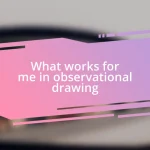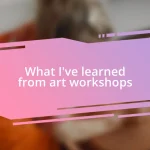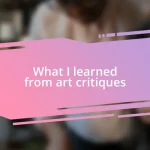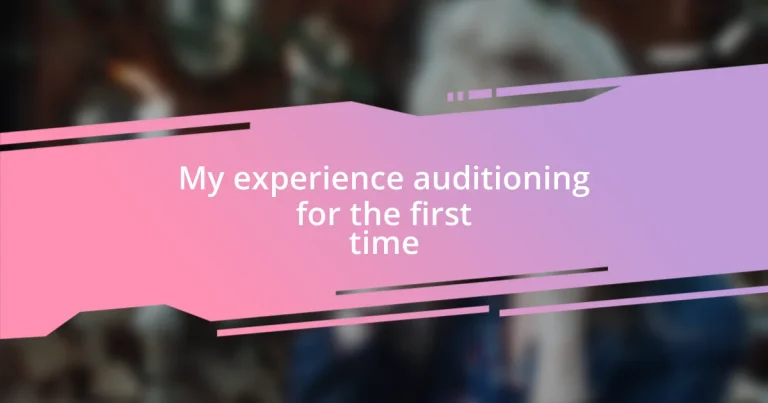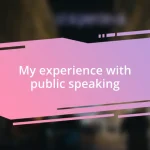Key takeaways:
- Preparation involves mental techniques like visualization, selecting meaningful material, and conducting thorough research to deepen character connection.
- Effective practice includes establishing a routine, seeking feedback from peers, and utilizing recordings to enhance performance.
- Managing nerves through breathing techniques and a supportive mindset can transform the audition experience into an opportunity for connection and expression.
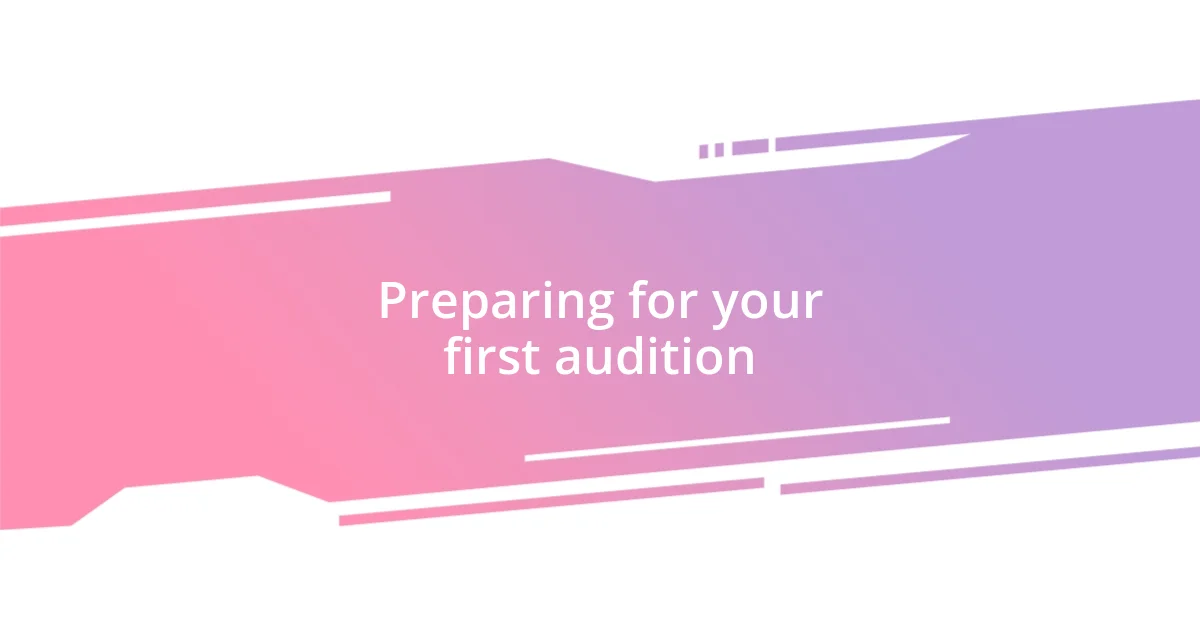
Preparing for your first audition
When I think about preparing for my first audition, I can’t help but remember the fluttering nerves that buzzed through me as the date approached. Have you ever felt that intense mix of excitement and anxiety? I certainly did. To ground myself, I created a checklist, focusing on the essentials: a favorite outfit that boosted my confidence, rehearsing my lines until they felt like second nature, and even practicing in front of a mirror. Every little detail mattered.
One thing I learned is the power of visualization. I would often close my eyes and picture myself walking onto the stage, feeling the lights on my face, and delivering my lines flawlessly. It was both calming and energizing. I began to realize that preparing for an audition isn’t just about memorizing lines; it’s about embodying the character and owning the moment. This mental preparation can set the tone for how you perform when the time finally comes.
I remember spending hours researching the role and the show itself, which deepened my connection to the character I was auditioning for. It’s amazing how understanding the context can bring layers to your interpretation. Have you ever immersed yourself in a role so deeply that it felt part of you? Completing this research not only reassured me but also ignited a passion that fueled my confidence during the audition.
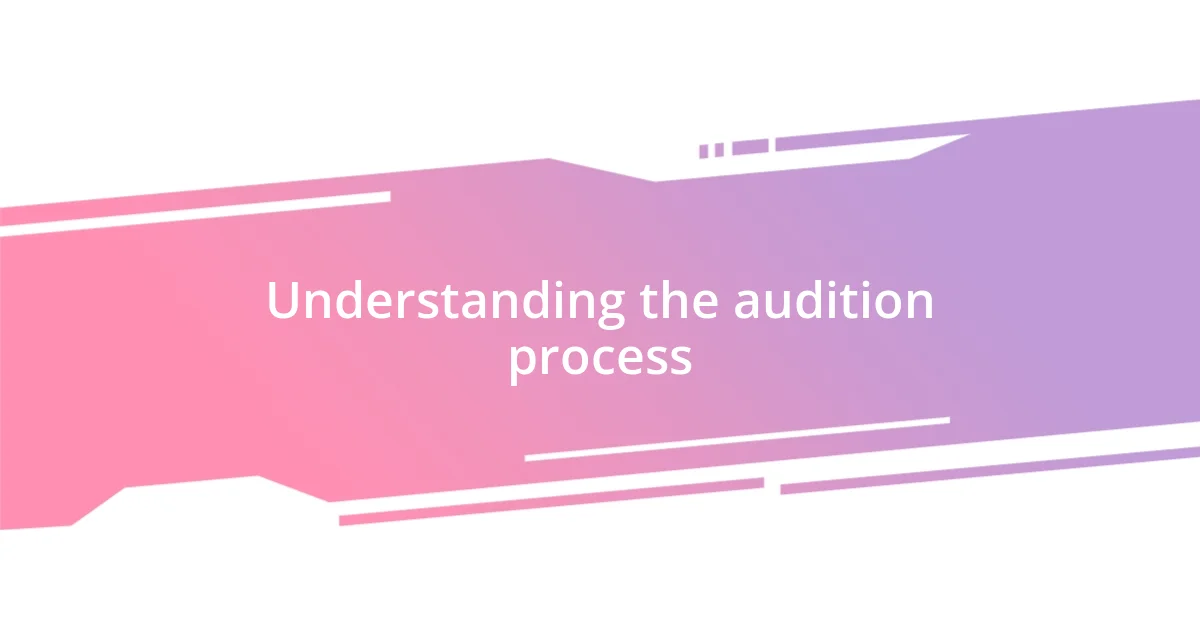
Understanding the audition process
Understanding the audition process can be both straightforward and intricate. The first step typically involves choosing the right audition material—a piece that resonates with you personally. I recall spending hours sifting through monologues, looking for the one that felt like an extension of my own emotions. It’s essential to select something that allows you to connect deeply, as that genuine connection often translates into a more compelling performance.
Next, you’ll encounter the audition itself. It’s crucial to familiarize yourself with the structure; usually, you’ll have an introduction followed by your performance, and possibly a cold reading. I remember stepping into the audition room, heart racing, with first impressions swirling in my mind. Each moment felt significant. I learned that being present, listening to the feedback, and engaging with the casting directors can make a difference in how you’re perceived. It’s not just about the performance; it’s about building rapport and showcasing your personality.
Finally, after your audition, the waiting game begins—an aspect I found particularly challenging. It’s easy to second-guess yourself during this time. I learned to channel that nervous energy into creative endeavors, whether it was rehearsing for a different role or writing. Embracing this uncertainty isn’t easy, but I found that keeping myself busy and focused on growth helped ease the anxiety of waiting for a callback.
| Step in Audition Process | Description |
|---|---|
| Selecting Material | Choosing a piece that resonates personally makes a significant impact. |
| Performing | Familiarizing yourself with the structure and being present is key for a successful audition. |
| Waiting | Embracing the uncertainty can be challenging but keeping engaged with other activities helps. |
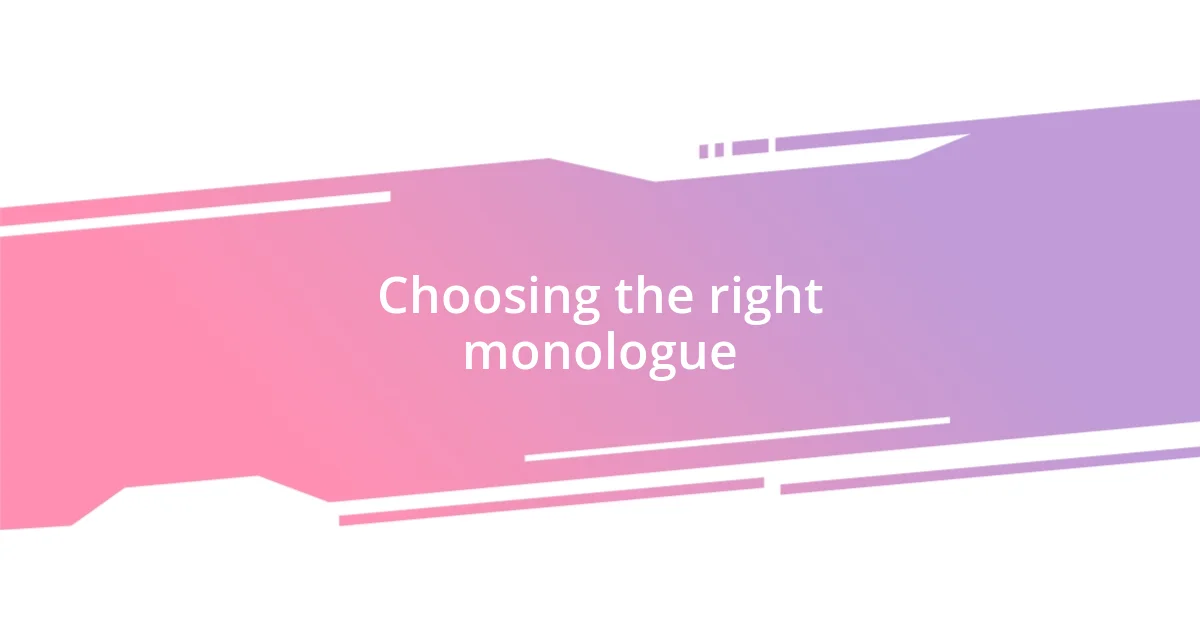
Choosing the right monologue
Choosing the right monologue was a pivotal moment in my audition journey. I remember standing in my room, surrounded by scripts, feeling like I was lost in a maze. So many selections, yet none resonated. It took time, but when I finally discovered a monologue that mirrored my own experiences, everything clicked. I felt a spark of excitement and familiarity—it was as if the words were waiting for me to uncover them.
Here are a few tips I learned while choosing my monologue:
- Authenticity Matters: Pick a piece that reflects your own emotions, experiences, or perspective. This makes it easier to infuse your performance with genuine feelings.
- Character Connection: Choose a character whose journey you can relate to. Understanding their motivations will make it easier to convey their story convincingly.
- Length and Timing: Ensure the monologue fits within the allotted time frame. Brevity can enhance the impact, allowing you to deliver a powerful performance without rushing.
- Variability: Opt for a piece that demonstrates a range of emotions or skills. A multifaceted portrayal can leave a lasting impression on casting directors.
- Practice Makes Perfect: Rehearse your monologue in different settings. I found practicing in front of friends helped me gain confidence and receive constructive feedback.
Finding that perfect monologue not only shaped my preparation but also gave me a sense of ownership over my audition. It felt like a personal expression, and I knew, regardless of the outcome, that I had shared a part of myself.
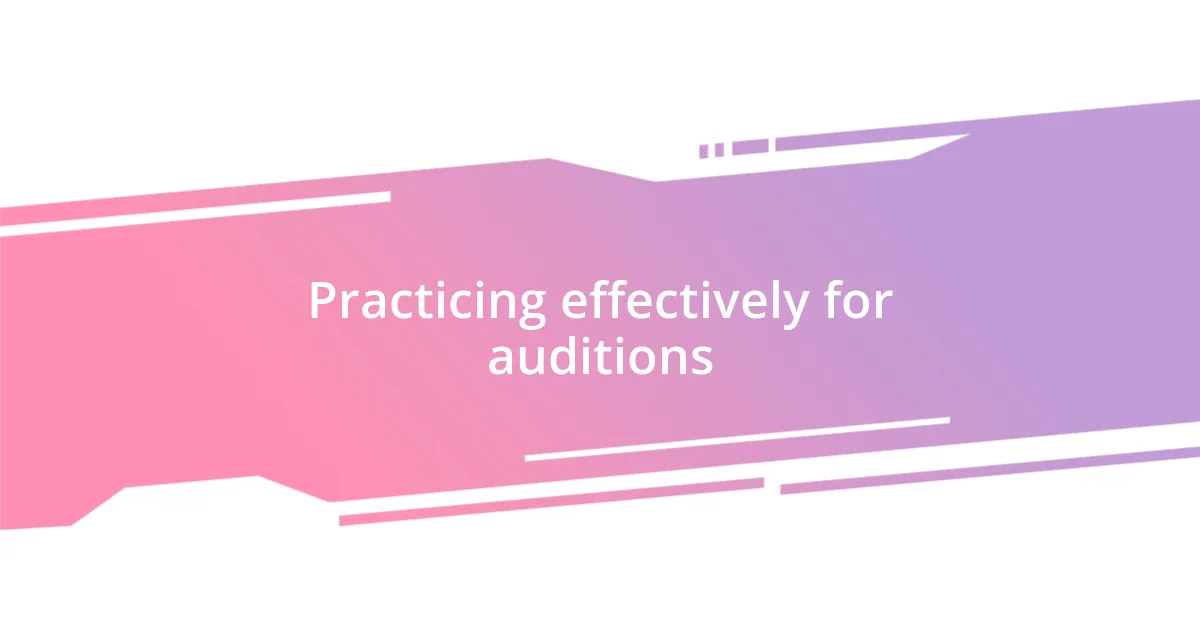
Practicing effectively for auditions
When I think about effective practice for auditions, one thing stands out: routine. I developed a consistent rehearsal schedule, dedicating specific days to explore character nuances and delivery. It’s amazing how repetition can build confidence, but I also learned to switch things up occasionally. Have you ever felt stuck in a routine? I certainly did. So, I’d take my monologue to a park, for instance, letting the fresh air invigorate my performance.
I found that recording myself was a game-changer. Watching those playback videos helped me spot areas I could improve. There were moments of cringing, sure, but also moments where I felt proud. Each recording revealed something new about my choices. Did I really embody the character’s emotions? Were my transitions smooth? If you haven’t tried this method, I highly recommend it.
Another crucial aspect was seeking feedback from trusted peers. I’d often gather a few friends to watch my practice sessions. Their fresh perspectives opened my eyes to things I hadn’t noticed. I remember one friend pointing out a specific line that lacked emotion and how, with just a bit of tweaking, it transformed the whole piece. It can be intimidating to be vulnerable, but collaboration often leads to growth. So, who can you invite to help you in your preparation?
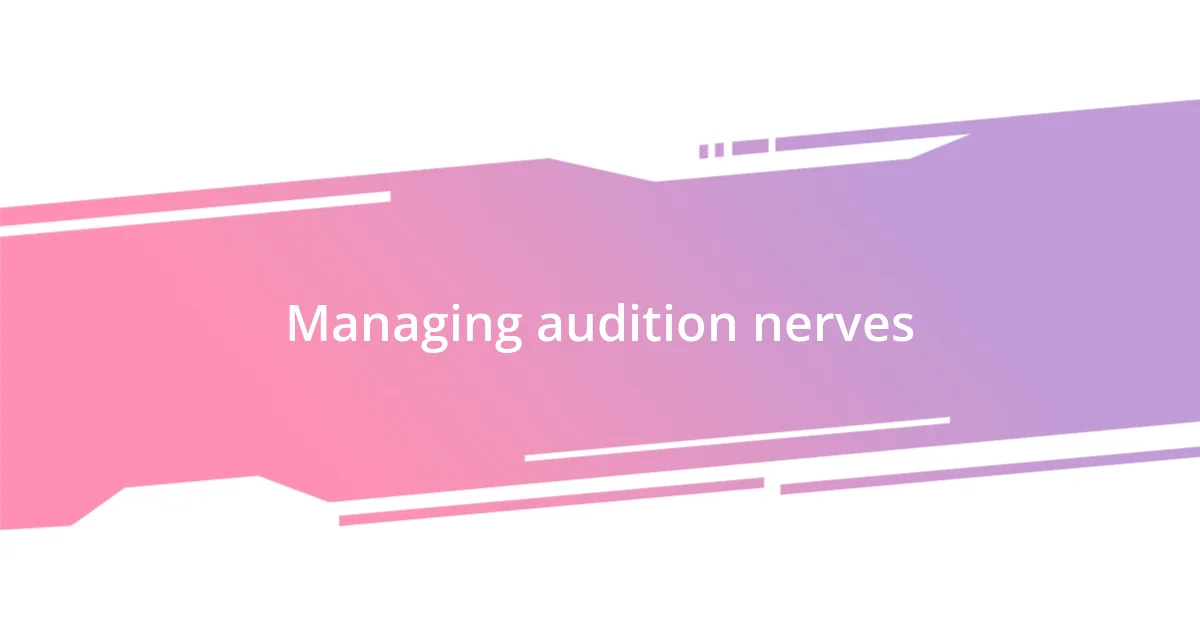
Managing audition nerves
Nerves before an audition can feel like a tidal wave, can’t they? I remember my first audition vividly; my heart raced and my palms felt clammy. To manage those nerves, I developed a simple pre-audition routine. Deep breathing was key for me. I’d take a moment to close my eyes, inhale deeply, and visualize a positive outcome. It might sound a bit cliché, but it worked wonders in grounding me, allowing me to focus rather than freeze under pressure.
Another technique I honed was to remind myself that everyone in the room—casting directors included—are rooting for me to succeed. It’s easy to view them as judges, but I learned to shift my mindset. Instead, I saw them as collaborators in a creative process. This perspective helped ease my anxiety and fostered a sense of connection. After all, aren’t we all just trying to create something beautiful together?
On the day of my first audition, I made a point to arrive early. This gave me time to soak in the environment and observe others. I noticed how many performers shared their own pre-performance rituals, whether it was stretching or whispering affirmations. This sense of camaraderie calmed my jitters, reminding me that I wasn’t in this alone. Have you ever considered how sharing an experience can transform your outlook? Embracing that interconnectedness truly helped me face my fears with a more resilient spirit.
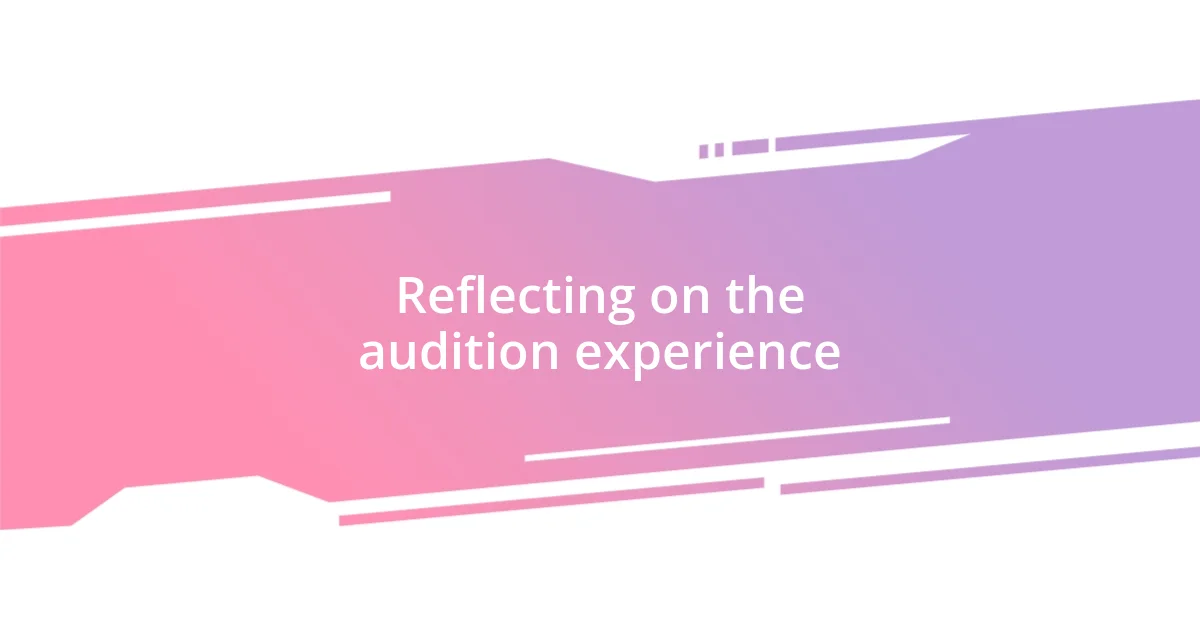
Reflecting on the audition experience
Reflecting on my audition experience, I can’t help but smile at how far I’ve come. The moments leading up to walking into that room were a whirlwind of excitement and fear. I vividly recall standing outside, pacing back and forth, wondering if I truly had what it took. Have you ever faced overwhelming uncertainty like that? For me, it was a crucial part of the journey, shaping not just my skills but my resolve to pursue acting.
Once I was inside and that spotlight hit me, all my previous worries melted away. I felt a mix of adrenaline and pure exhilaration. It was as if time stood still, and I was living in the moment. Interestingly, it took me a while to realize this wasn’t just a test, but an opportunity to share a piece of myself with others. Isn’t it fascinating how a single moment can shift your perspective completely?
Post-audition, the reflection hit me hard. I evaluated everything—my performance, my emotions, even the energy in the room. There were highs and lows, moments I regretted, and others I embraced wholeheartedly. I remember stepping outside, taking a deep breath, and feeling a wave of relief wash over me. I learned that each audition was a stepping stone, teaching me resilience and deepening my love for the craft. What surprises have you uncovered when you took time to reflect on your experiences?


